
1. Don’t skip pre-race meals
Running a marathon on an empty stomach isn’t recommended. According to Dr. Trent Stellingwerff, lead of innovation and research at the Canadian Sport Institute in Victoria, BC, skipping a pre-race meal could leave you feeling lightheaded, and fatigued. It could also decrease your performance. “You’re probably best served to get something nutritious in your body before heading out,” says Stellingwerff. There are always exceptions to the rule, but for the majority of marathoners, eating something beforehand will make a difference in how (and if) they finish the race.

2. Know your body
Some marathoners prefer to eat four hours before a race, while others swear by the two-hour rule. Know how your body responds to food and plan the timing of your pre-race meal accordingly. “Everyone is different, so the timing for a pre-race meal is anywhere during the four hours before the event,” says Stellingwerff. “If you get queasy eating two hours before the race, bump back your meal time to three or four hours before start time.”
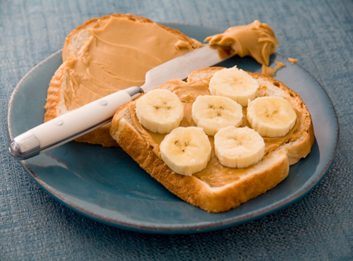
3. Try different options
“[While training] practice with several food and drink options to find what works for you,” says Stellingwerff. If consuming a specific food makes you feel too full or nauseous, try something different on the next training day. The key is to find a pre-race meal that makes you feel energized, not sluggish. Aim for an easy to digest meal that features minimal fat, fiber and protein, and contains between 1 to 4 grams of carbohydrate per kg of your body weight. “For a 68kg (150 lb) person, that’s a carbohydrate range of 75 to 300 grams,” says Stellingwerff. “Energy bars, bagels, whole-grain breads, and bananas are processed pretty quickly and easily by your GI tract.”
Need help figuring out the nutrients in your pre-race meal? Turn to free online tools such as Calorie Count for investigating nutritional content. By trying different food options during training, you’ll eliminate potential problems on race day.
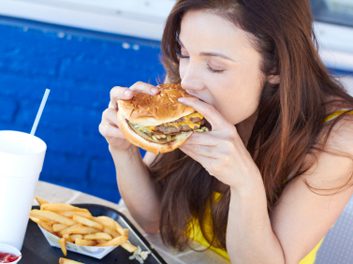
4. Avoid bad food choices
“The jury’s still out on whether or not specific food choices can increase your performance, but bad choices can certainly decrease performance. If you have a stomach upset, performance-wise, you won’t go as fast,” says Stellingwerff. Fatty or dense foods that take a while to digest such as pizza, steak and French fries could slow you down.
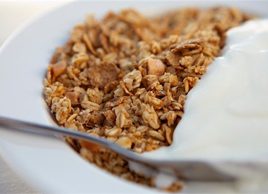
5. Short race? Have a small meal.
Stellingwerff says that a shorter race begs for a smaller meal. “During a 5K you’ll run at a higher intensity than you would run a marathon. That higher intensity puts more stress on your gastrointestinal tract, increasing the potential for stomach or gastrointestinal (GI) upset,” he says. To avoid nausea, stomach cramps, or vomiting during a shorter race, choose a smaller meal that ranges from 160 to 275 calories. Before races that are longer in duration, it’s okay to consume more calories because the exercise intensity is lower, so the risk of stomach upset decreases.

6. Find a balance
New marathon runners often make meal mistakes that could’ve been easily avoided. “They’re either too nervous and eat nothing, or they over drink or overeat and cause either gastrointestinal problems – because there’s too much food in their GI tract – or over-hydration,” says Stellingwerff. Finding a healthy and comfortable balance for your stomach will make for a much more enjoyable marathon experience.

7. Keep an eye on the weather
Make note of the predicted temperature on race day. If it’s hot and humid, you’ll require more fluids before you run. Higher temperatures also tend to increase the risk of stomach upset, so plan your meal accordingly.
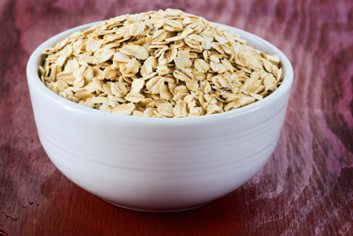
8. Meal options for short races (under 60 min.)
Stellingwerff compiled a helpful list of pre-race meals for shorter races. Each selection is considered one pre-race meal option:
– 1 cup of low-fiber cereal with ½ cup skim milk (195 calories)
– 2 large fig cookies (198 calories)
– 1 cup of berries with ½ cup low-fat cottage cheese (160 calories)
– 200 ml low-fat fruit yogurt and 1 medium peach (275 calories)
Other pre-race options include bagels, whole-grain breads, fruits, sports drinks, oatmeal, energy bars, and shakes.
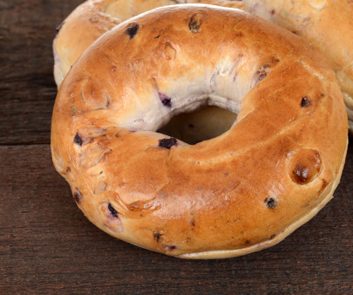
9. Meal options for long races (over 60 min.)
For long races, Stellingwerff offers the following recommendations. Each selection is considered one pre-race meal option:
– 1 medium banana topped with 1 tablespoon of nut butter (200 calories)
– 1 bagel with 1 tablespoon of nut butter and 1 tablespoon of jam or honey (390 calories)
– ½ cut steel-cut oats with skim milk, topped with 1 cup of sliced strawberries (256 calories)
– 2 ounces of pretzels with 2 tablespoons of hummus (263 calories)
– 2 whole-grain waffles (frozen) with 2 tablespoons of maple syrup (270 calories)
– Peanut butter and banana sandwich on whole-grain bread (360 calories)
– 2 ounces of honey whole-wheat pretzels dipped in 1 tablespoon of natural peanut butter (230 calories)
– 500ml of sports drink (125 calories)
– 15 animal crackers dipped in 2 tablespoons of peanut butter (390 calories)
– 1 cup of Apple Cinnamon Os cereal with 1 cup of skim milk and 1 medium banana (255 calories)
– 3 ounces of deli turkey wrapped in a flour tortilla with 1 cup of shredded veggies (275 calories)
Related:
• 10 must-run races in Canada
• 9 healthy hydrating foods
• Our best healthy energy bar recipes

Don’t pick your scabs
Nothing quenches your thirst on a hot day like a chilled glass of lemonade. That sweet, sunny flavour brings back great memories of fun-filled days spent outdoors as a kid. With next to no effort, you can relive that tart taste without an abundance of calories.
One to try: Swap your typical glass of fresh squeezed lemonade sweetened with sugar for 8 fluid ounces of fresh-squeezed lemonade sweetened with SPLENDA® No Calorie Sweetener – you’ll save 84 calories. Think sugar, say SPLENDA®.
